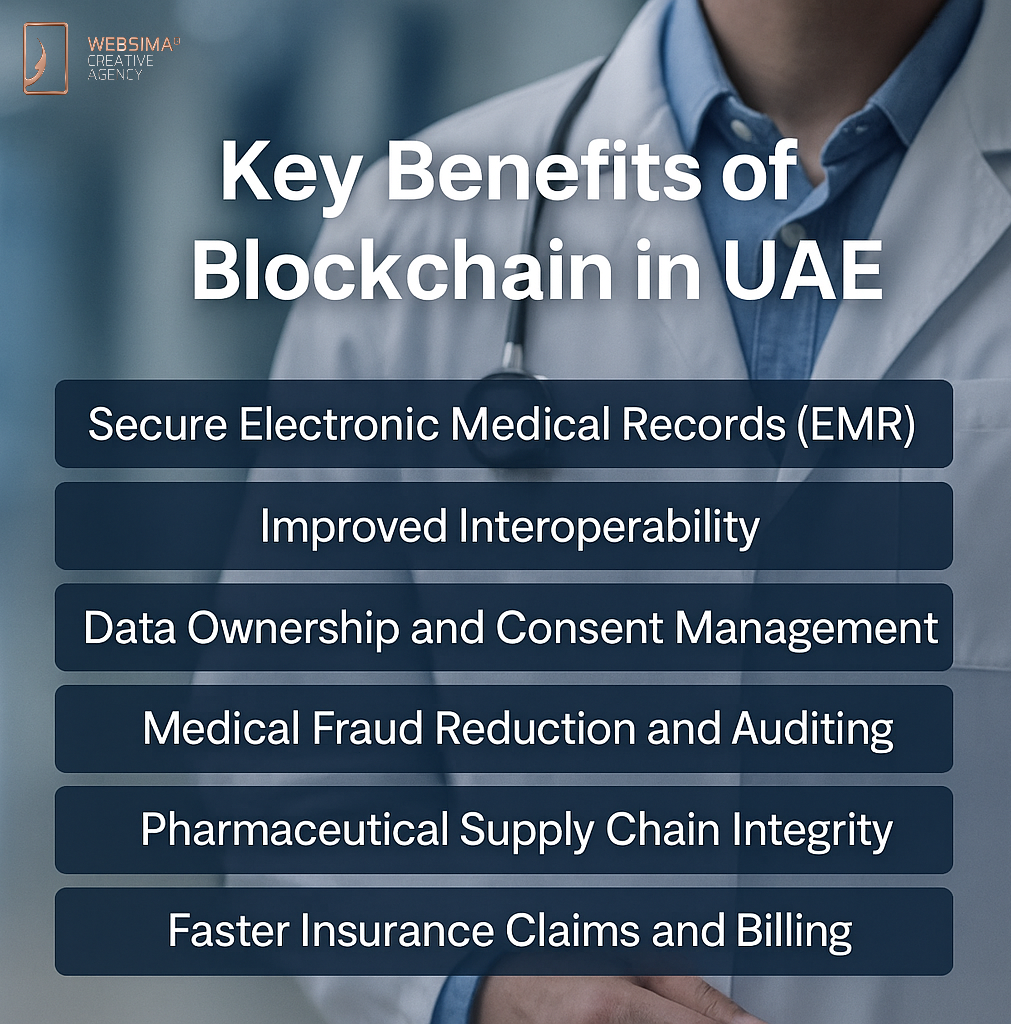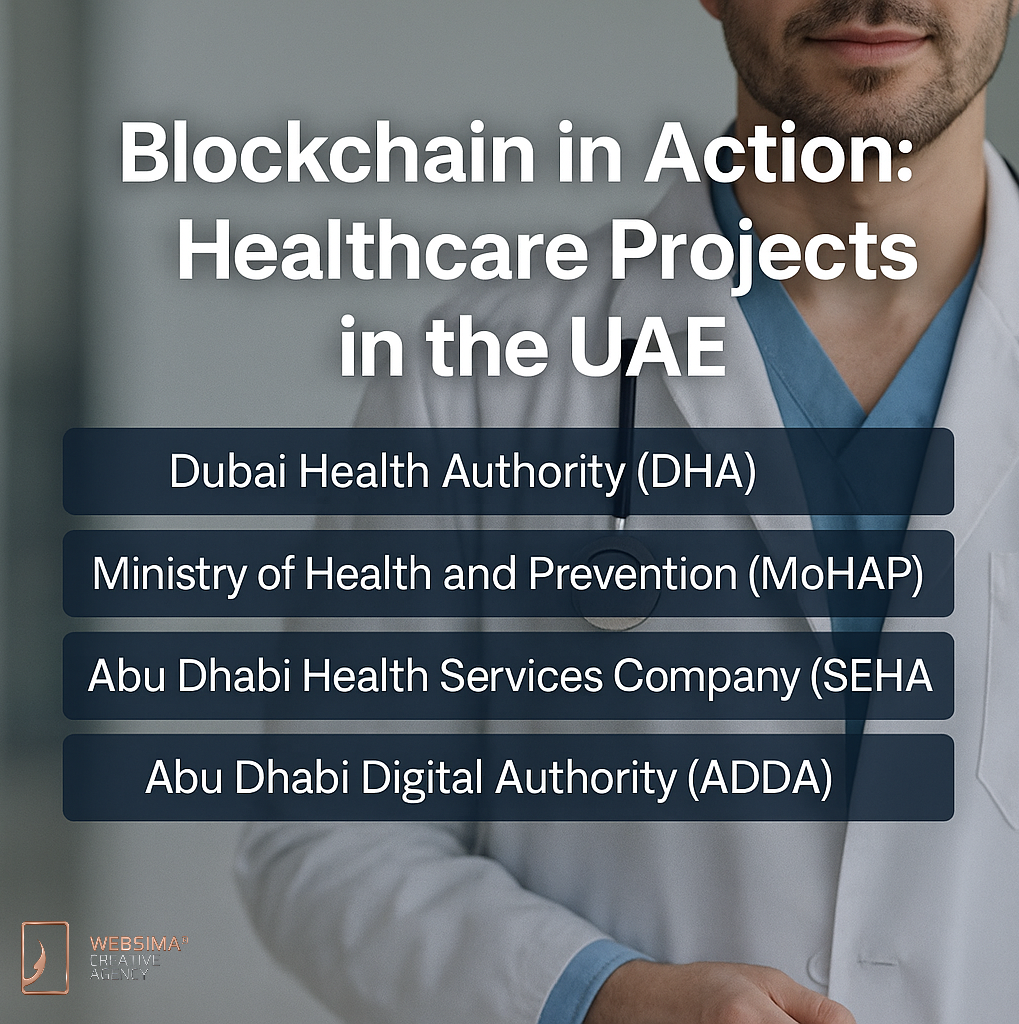Introduction: The Role of Blockchain in Modern Healthcare
The United Arab Emirates is rapidly embracing cutting-edge technologies as part of its broader economic and digital transformation strategy. One of the most promising technologies shaping the future of its healthcare system is blockchain. As part of the UAE’s Vision 2031 and the National Strategy for Artificial Intelligence 2031, the government has prioritized data-driven healthcare services built on secure, interoperable platforms. In this context, blockchain in UAE healthcare is not just a futuristic concept—it’s becoming a regulatory and operational cornerstone.
Globally, healthcare systems suffering from inefficiencies ranging from fragmented data silos to administrative errors and data breaches. According to a PwC report, blockchain technology could boost global GDP by $1.76 trillion by 2030, with healthcare expected to benefit significantly through streamlined processes and fraud reduction.
In the UAE, where trust, innovation, and digital excellence are critical national values, blockchain presents a foundation for building a smarter, safer, and more patient-centric health ecosystem. That is how the UAE government supports Web3 and blockchain innovations.
Understanding Blockchain in Healthcare
https://t.co/1f6ybmiNzB
A blockchain-based eHealthcare system interoperating with WBANs
Future Generation Computer Systems
Volume 110, September 2020, Pages 675-685 pic.twitter.com/UtHFTTgU6l— Psinergy-solafide (@psinergy_SDW) July 15, 2025
At its core, blockchain is a decentralized digital ledger that records transactions across a network of computers. Each record is encrypted, timestamped, and linked to the previous one—creating a chain of data blocks that cannot be altered retroactively.
In the healthcare sector, this technology has wide-reaching implications:
- Patient records are sharable among different providers with permissioned access, ensuring continuity of care without compromising privacy.
- Insurance claims become automatic, using smart contracts to reduce paperwork, fraud, and processing time.
- Medical supply chains become trackable in real-time, verifying the origin and journey of pharmaceutical products.
In essence, blockchain transforms how health information is stored, accessed, and shared—replacing outdated, siloed systems with secure, real-time networks of trust, making it one of the top blockchain startup ideas for entrepreneurs in Dubai and UAE.
Key Benefits of Blockchain in UAE Healthcare

1. Secure Electronic Medical Records (EMR)
Traditionally, medical records in the UAE have been scattered across public and private institutions. This fragmentation often leads to redundant tests, delayed treatment, and administrative complexity. Blockchain enables the creation of longitudinal, interoperable medical histories that are cryptographically secured.
Each transaction or access to a patient’s EMR is recorded and time-stamped, offering full visibility and data provenance. Patients can control who accesses their data and revoke access at any time using private keys. This reduces unauthorized data sharing and enhances privacy compliance.
2. Improved Interoperability
Interoperability is one of the most pressing challenges in healthcare. Inconsistent systems and formats often lead to information silos between hospitals, insurers, labs, and regulators.
Blockchain provides a shared, standardized data layer that all authorized entities can access and update without duplication or conflict. According to a Invensis paper on blockchain in healthcare, interoperability via blockchain could dramatically reduce administrative costs and errors.
3. Data Ownership and Consent Management
Under blockchain-enabled systems, patients become the rightful owners of their health data. They can decide who can view or use their information—whether for treatment, research, or insurance—by granting access via smart contracts.
This is particularly important in the UAE, where a growing number of healthcare startups and platforms are handling sensitive biometric and genomic data. Consent can be customized, time-bound, and revocable, ensuring full patient agency and compliance with UAE’s Federal Law No. 2 of 2019 on health data privacy.
4. Medical Fraud Reduction and Auditing
Healthcare fraud—ranging from identity theft to falsified claims—is a multibillion-dirham problem globally. Blockchain’s immutable audit trails can make it nearly impossible to tamper with medical data or insurance transactions.
For example, every procedure, prescription, or lab result is logged permanently, preventing duplicate claims or forged bills. Regulators and auditors can review real-time data integrity through blockchain dashboards, enhancing transparency across the system.
5. Pharmaceutical Supply Chain Integrity
Blockchain is already being piloted to fight counterfeit drugs in the UAE. According to the World Health Organization, 1 in 10 medical products in developing countries is substandard or falsified.
Blockchain allows pharmaceutical companies and regulators to track the provenance of medications from manufacturer to pharmacy shelf. It also allows for recall alerts, expiry tracking, and chain-of-custody auditing—all vital for patient safety and regulatory enforcement.
6. Faster Insurance Claims and Billing
The UAE’s healthcare insurance market is sophisticated but still bogged down by manual verification and delays. Blockchain-based smart contracts can automate claim approval when conditions are met—eliminating the need for middlemen and manual reconciliation.
This not only improves patient experience but also reduces friction between healthcare providers and insurers.
Blockchain in Action: Healthcare Projects in the UAE
Several real-world projects in the UAE underscore blockchain’s growing role in healthcare transformation:

Dubai Health Authority (DHA)
The DHA was one of the first government bodies to launch a blockchain-based EMR pilot project in partnership with tech firms. It enables encrypted access to patient records across DHA hospitals, labs, and pharmacies.
Ministry of Health and Prevention (MoHAP)
As part of the Emirates Blockchain Strategy 2021, MoHAP developed a platform to digitally register and verify healthcare professionals, facility licenses, immunization records, and prescriptions. The initiative is integrated with the UAE’s National Unified Medical Records system.
Abu Dhabi Health Services Company (SEHA)
SEHA has begun adopting blockchain to enhance data exchange between its vast public hospital network and the growing number of private clinics across the emirate. These efforts aim to reduce redundancy, especially in diagnostic procedures.
Abu Dhabi Digital Authority (ADDA)
The ADDA has been exploring blockchain applications across eHealth services, particularly for real-time prescription verification and patient referrals between public and private providers.
Challenges in Adopting Blockchain in UAE Healthcare
While blockchain offers enormous promise, its integration into healthcare is not without roadblocks:
- Legacy System Compatibility: Many healthcare providers still operate on outdated or incompatible digital infrastructure. Blockchain requires API integrations and significant IT upgrades to work seamlessly.
- Scalability: Processing large volumes of real-time medical data on blockchain can be resource-intensive. You may need Hybrid models or Layer 2 solutions.
- Technical Literacy: Many healthcare professionals lack the training or knowledge to understand or operate blockchain systems.
- Regulatory Frameworks: Although UAE is blockchain-friendly, there is still a need for more robust regulatory standards for health data governance, storage localization, and patient rights.
Nonetheless, UAE’s proactive stance and smart government ecosystem position it well to overcome these challenges.
How Blockchain Supports UAE’s Health Tourism Strategy
The UAE, especially Dubai, is a rising star in global health tourism. Blockchain enables cross-border medical data portability, which is critical for international patients seeking specialized procedures or long-term treatments.
Benefits include:
- Access to verified health records upon arrival
- Transparent billing and insurance integration
- Real-time updates for remote consultations and post-treatment care
These features align perfectly with Dubai’s ambition to be a smart medical tourism hub, attracting patients from Europe, Asia, and Africa.
Future Outlook: Blockchain, AI, and IoMT Convergence
The convergence of blockchain with Artificial Intelligence (AI) and the Internet of Medical Things (IoMT) is about to reshape healthcare in the UAE further.
Examples of this integration include:
- AI-powered diagnostics based on blockchain-verified historical records
- Wearable medical devices that transmit data securely using blockchain
- Decentralized clinical trials using real-time, validated participant data
- Genomic data sharing platforms with built-in patient consent on-chain
Innovations are already being tested in Dubai Science Park, Masdar City, and Abu Dhabi’s Hub71, with support from accelerators like In5, HealthTech Hub, and international firms like IBM, Oracle, and ConsenSys.
Conclusion
Blockchain is no longer a buzzword in UAE’s healthcare—it is a critical infrastructure layer. It enhances transparency, secures data ownership, streamlines workflows, and reduces costs across the medical value chain.
With bold government initiatives, strong private-sector support, and rising demand for efficient and ethical healthcare, the UAE is about to become a global pioneer in blockchain-powered health systems. As the ecosystem matures, we can expect blockchain to move from pilot projects to mandatory national standards in digital health.
Frequently Asked Questions (FAQ)
Are UAE’s public hospitals using blockchain?
Yes. The Dubai Health Authority and MoHAP have launched blockchain initiatives, and several public and private hospitals are piloting decentralized record systems.
Is blockchain compliant with UAE’s data protection laws?
Yes. When configured correctly, blockchain can comply with Federal Law No. 2 of 2019 on the use and protection of health data, as well as international frameworks like GDPR.
Can blockchain prevent healthcare fraud?
Absolutely. Blockchain creates permanent, auditable records that drastically reduce the risk of data manipulation, identity theft, and duplicate insurance claims.
Are there any startups in UAE healthcare using blockchain?
Yes. Companies like Avanza Solutions, HealthBank, and Medicalchain have either partnered with or launched pilots in UAE healthcare environments.
Transform the Future of Digital Health with Websima
At Websima, we help innovators harness blockchain to build secure, compliant, and future-ready digital ecosystems. Whether you’re developing smart contracts for clinical trials, designing secure patient portals, or building a tokenized health records infrastructure, our blockchain development team brings deep experience across both healthcare and fintech sectors.
If you’re a healthcare provider, tech startup, or investor exploring blockchain in UAE healthcare, contact our team now to discuss tailored solutions that align with your operational and compliance goals.
Stay ahead of the curve—start building your blockchain-enabled healthcare platform with Websima today.





